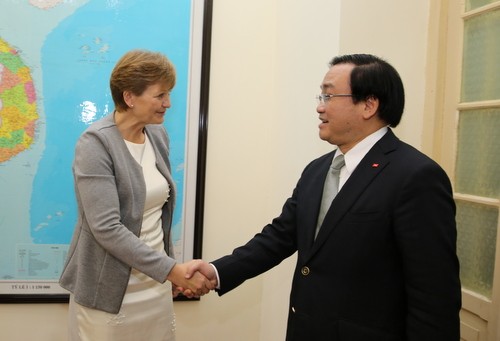(VOVworld) – Vietnam’s agriculture has achieved noticeable growth after two years of implementing a project on agricultural restructuring to increase added value and sustainable development. To deal with challenges brought in by free trade agreements, this year the sector has stepped up the restructuring process to create a firm foundation for sustainable integration in 2016.
The Ministry of Agriculture and Rural Development has broken down the project on Vietnam’s agricultural restructuring into sub-projects in cultivation, breeding, forestry, aquaculture, irrigation, and processing of agricultural, forestry, and aquatic products, as well as salt.

Deputy PM Hoang Trung Hai (R) and Danish Minister for Food, Agriculture, and Fisheries Eva Kjer Hansen, in Hanoi on November 9, 2015. Vietnam is accelerating the agricultural restructuring towards large-scale production and global production chain and hopes to cooperate with Danish enterprises for mutual benefits. (Photo: mpi.gov.vn) |
In 2015 the sector earned 880 million USD in production value, up 2% from the previous year. Economist Le Dang Doanh commented on this achievement: “Vietnam’s agriculture has been restructured, already showing moderate success. Most outstanding is the model of large-scale rice fields. Many enterprises have invested in agriculture, including the Vincom group, who have invested in safe vegetable and fruit production. The sector should accelerate restructuring to ensure food hygiene and safety for exports.”
Vietnam is pursuing the restructuring of agricultural breeding systems by zoning, grouping animals, husbandry methods, and upgrading the slaughtering system to be able to join global production chains.
In 2015 the breeding sector’s economic value increased 5% from 2014, meeting both domestic food needs and export requirements.
Minister of Agriculture and Rural Development Cao Duc Phat said the agricultural restructuring is one of the factors that will help restructure the national economy and renovate its growth model, along with socio-economic development strategies and the plans of each locality.
Phat called for “applying top-priority comprehensive measures to re-arrangement production of involving more businesses, cooperatives, and value chain links. This will be necessary to further increase the application of science and technology by providing more technical training for farmers to improve agricultural production and raise their incomes.”
To deal with the opportunities and challenges brought in by free trade agreements, the Trans-Pacific Partnership deal, and Vietnam’s membership of the ASEAN Economic Community in 2016, the sector has been intensifying the application of science and technology to production and processing on a larger scale, according to Doctor Nguyen Minh Duc.
He underlined the fact that “we should improve competitiveness. But how can farmers increase competitiveness without support from relevant agencies and administrations at various levels, who will create better conditions for them to access information, markets, equipment, new technologies, and new machines.”
Deputy Minister of Agriculture and Rural Development Tran Thanh Nam said with about 10 million households engaged in agricultural production, Vietnam should strengthen links among scientists, businesses, and farmers to enhance the competitiveness of domestic products.
“The requirements of the global market pressure Vietnam to restructure its agriculture to increase added value in our farm produce. Provinces should identify what kinds of plants or animals are their main product and find ways to raise their value,” Nam said.